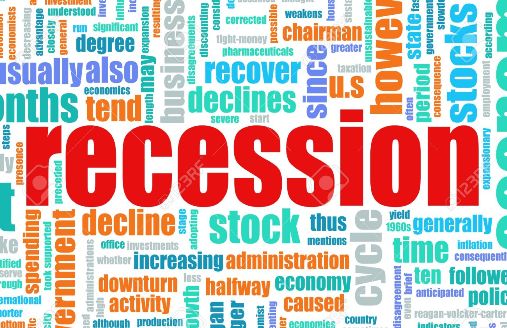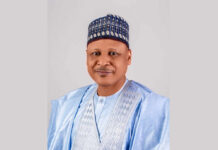By Sampson Ikemitang
Despite a gloomy picture of the Nigeria’s economic fortune, and Government’s acknowledgement that indeed, the country was technically in recession, experts have said, there was no cause for alarm, as recession is not a death sentence. This is against the backdrop that recession has a tendency to force leadership at all levels of Government to put their thinking caps on, think out of the box; develop other sectors of the economy like agriculture, solid minerals and tourism, which were hitherto left untapped so as to bring about multiple stream of foreign exchange earnings for the country.
It should be recalled that the country has over the years largely depended on oil, to address the developmental needs of the Federal Government, the 36 States and the FCT, as well as the 774 Local Government Areas. This is no longer sustainable.
Recession is a period of temporary economic decline during which trade and industrial activity are reduced, generally identified by a fall in GDP in two successive quarters. Economic recession, according to the National Bureau of Economic Research (NBER), United States, is defined as “a significant decline in economic activity spread across the economy, lasting more than two quarters which is six months; normally visible in real GDP, real income, employment, industrial production and wholesale – retail sales.”
Expectedly, mixed reactions have greeted the ongoing economic recession. While some have traced the recession to the massive looting perpetuated by some officials of previous administrations, both the military and civilian alike, which they claim depleted the nation’s external reserve to a very large extent. Others have simply attributed it (the recession) to President Buhari’s inability to constitute a sound economic team for the country, despite over 12 months of his administration. Yet, many opined that the failure of the leadership in years past, to diversify the nation’s economy had fuelled the recession.
Whichever side of the divide one is persuaded to align with, one thing is discernible. Recession can be said to be an economic accident occasioned by the actions or inactions of Government through policy decisions. Besides, it can also be triggered by citizens’ ostentatious lifestyles. A classic example is a situation where citizens have uncontrolled preference for foreign goods over the ones produced locally. The implication is that so much financial resources are expended on importation without a corresponding export to earn revenue. This makes it difficult for a country to achieve balance of trade, thereby posing grave danger for its economy. Needless therefore to say, no economy, no matter its level of sophistication is immune to it (recession) when there is poor governance and overdependence on foreign consumption.
It would be recalled that for over three and the half years, from 2007 to 2009, to be precise, the wind of global economic recession or meltdown blew through the economies of the United States, Argentina, Greece as well as virtually all the developed and developing countries. In fact, nations caught in this web of recession suffered significant setback. Observers are quick to point out that during this period that the world’s economy was in comatose and experienced untold economic woes, the Nigeria’s economy was solidly on its feet. The country raked in $145 per barrel from crude oil sales. That the Government Officials charged with managing the nation’s economy do not take care to note that prices of crude oil ( our main export product) is outside their control, means that just anything could happen when we least expect. Perhaps, with this in mind, it would have propelled the diversification of the nation’s economy; to stave off any unforeseen economic misfortune. Today, nine years down the line, the reality is here with us. We are neck-deep in recession.
While speaking at a press conference in Abuja, the first Vice President, Institute of Strategic Management of Nigeria (ISMN), Mr. Gbenga Oluniyi said, recession was good and necessary to make the country exploit other capacities inherent in the economy. According to him, “What is happening now is a natural consequence where you just have to find a way. The current Government technically admitted that we are in recession. To be in a recession is not completely a bad thing, he says, “It drives you to think out of the box.”
He continued: “Sincerely speaking, we have about 27 States out of the 36 States of the Federation in a very difficult situation. The question we should ask ourselves is: What have the remaining nine States done differently to keep their heads above waters? For instance, Ogun State is not an oil producing State. The State has decided to leverage on its proximity to Lagos and today, the fastest growing industrialization in Nigeria is taking place in Ogun state. You don’t hear of labour unrest in the State because salaries are being paid as and when due.
Ordinarily, regarding federation revenue distribution, Ogun State is one of the States that should be complaining. Other States can also begin to look inwards. Whatever comes from the centre should actually be a bonus to them (States).
“The institute is happy with what is happening now because we really have not been thinking. We have been lazy. The Raw Materials Research and Development Council had carried out studies that in every State of Nigeria, you can find mineral that can be explored and exploited on commercial basis. This is not being done by the Government. We are beginning to see Government look inward now,” the statement said.
Similarly, the Speaker, Federal House of Representatives, Mr. Yakubu Dogara has called for a collective effort in tackling Nigeria’s socio-economic challenges. He made this known while delivering a lecture organized as part of the programme for the 75th birthday celebration of Chief Alani Bankole, father of former Speaker of the House, Dimeji Bankole in Abeokuta, the Ogun State capital.
According to him, “The challenges are not novel because a lot of countries have passed through them. It is always men and women of those generations that have stood up and solved the problem.” He therefore, called on all and sundry to rise up to the occasion and confront our common challenges in order to steer the country out of recession.
A development economist, Odilim Enwegbara who was guest at one of the editions of Kakaaki programme of the African Independent Television (AIT) said, “Recession is a blessing in disguise.” He argued that, if Nigeria should have 80% of her consumption produced locally, in line with local content policy, the nation’ s local industries will experience a boost in productivity, and this will ultimately grow the economy.
Contrary to the general assertion that the failure of the past administrations to save for the rainy day, brought about the current economic crisis, a former external affairs minister, Bolaji Akinyemi has this to say. “If we have to lay blame, it should be at the door of those responsible for the 1999 Constitution.” He however noted that this does not mean Gen. Abdulsalami Abubakar alone, or the military regime alone, but includes elements of the judiciary and civilians who were all instrumental in constructing that Constitution.
According to him, “Serious attempts were made by both the Olusegun Obasanjo and Goodluck Jonathan administrations to put in place savings through the backdoor such as the Excess Crude Account and Sovereign Wealth Funds.” He noted that both were frustrated by the State Governors and the judiciary.
Buttressing his point, Mr. Akinyemi cited section 162 of the 1999 Constitution (as amended), which makes it mandatory for the largest chunk of the revenue generated by the country to be deposited into a central account for onward distribution among the Federal, States and Local Governments. This according to him was the bane of Nigeria’s savings culture.
Pointing the way forward, Mr. Akinyemi called on President Buhari to quickly push for the amendment of the Constitution by particularly modelling it after the Norwegian Constitution. “The Norwegian model involved pooling 100 per cent of Government’s revenues from royalties and dividends into a central account with a provision that not more than four per cent could be withdrawn in a year,” he explained.
Borrowing a leaf from countries that had suffered economic recession in recent past, for instance, the United States, Argentina and Greece as mentioned earlier, analysts are of the opinion that the fastest possible way out of recession is for the Government to initiate and implement numerous economic policies aimed at reversing the trend and help prevent a similar financial crisis in the future. They also said, the Government should inject more liquidity into the economy to stimulate productive activities, with a view to taking the country out of recession.
More so, as we strive to exit the current economic logjam, every patriotic citizen is required to cultivate a habit of patronizing locally made goods and services, if we must as quickly as possible grow our own economy. Our continuous preference for foreign goods over the locally made ones can at best empower other countries’ economy, to produce more, at the expense of our economic growth and development. The implication is not farfetched. The nation’s economy will indeed suffer severe dislocation and paralysis, and above all remain in a very dicey and precarious situation, such as we are in – recession.
It is crystal clear from the foregoing that to get out of the current economic crisis, it may not be entirely the responsibility of the Federal Government alone, or private sector or a single individual’s work. Absolutely not. It requires our collective resolve to salvage the hitherto largest economy in Africa from the suffocating grip of recession. In fact, all hands must be on deck to edge the country out of its current economic quagmire and ensure that it does not slip into depression. The Government and other relevant stakeholders should use the opportunity provided by the Economic Summit in Abuja to brainstorm and come up with concrete measures that if implemented, will relaunch the country into the global sphere of economic prosperity.
Sampson Ikemitang writes from Federal Ministry Information and Culture, Abuja.





